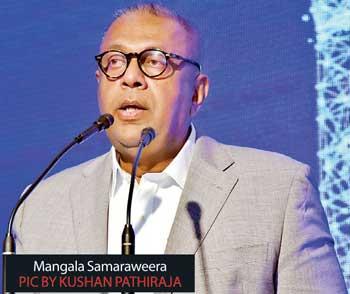18 Sep 2019 - {{hitsCtrl.values.hits}}
 Although, Sri Lanka needs decisive leaders, the country can never achieve its economic objectives with a decisive leadership that compromises democracy and the rule of law.
Although, Sri Lanka needs decisive leaders, the country can never achieve its economic objectives with a decisive leadership that compromises democracy and the rule of law.
“Some people with short memories say they want decisive leadership. That is good. Sri Lanka needs decisive leaders. But it certainly cannot realize its economic objectives with leaders who decisively sack the judiciary, decisively murder, decisively undermine the rule of law and cultivate a culture of impunity, decisively ignore procurement procedures for their own benefit, and decisively expropriate private investment,” Minister of Finance, Mangala Samaraweera said.
He shared these views speaking at the Sri Lanka Economic Summit 2019 in Colombo yesterday.
Samaraweera claimed that the absence of rule of law in the country during the past regime was a key reason for failure for a much anticipated post-war economic boom.
“The previous regime’s naked power grab - by stabbing the rule of law in the back - was a key reason for the failure of the promised post-war investment boom to materialize. Foreign and domestic businesses decided that their factories and investments would be safer in Ethiopia, Bangladesh or Vietnam,” he elaborated.
Further, he cited that lack reconciliation efforts as well as economically-isolationist policies as main reasons for the failure for an economic-take off in the post-independent Sri Lanka.
“Motorola and Harris Corporation were building semi-conductor factories in the Katunayake Free Trade Zone by early 1983. Sony, Sanyo and other Japanese companies were also planning to invest in Sri Lanka. However, just as the Japanese delegation arrived in Colombo, the 1983 riots broke out.
“Motorola’s manager was killed in the riots and construction stopped. The Motorola factory moved to Malaysia. And unfortunately for Sri Lanka, it is Penang, and not Katunayake, which is the micro-processor manufacturing capital of the world today.
“Reconciliation is an absolute necessity for economic development. There is no way of harnessing our potential as a modern, stable, prosperous nation, without celebrating the diversity of our country as a multi-ethnic, multi-religious and multi-lingual nation,” he elaborated.
The minister emphasised that Sri Lanka moved away from a corrupt, discretionary economic system towards a transparent, rules-based level playing field over past few years. (NF)
24 Apr 2024 1 hours ago
24 Apr 2024 1 hours ago
24 Apr 2024 2 hours ago
24 Apr 2024 2 hours ago